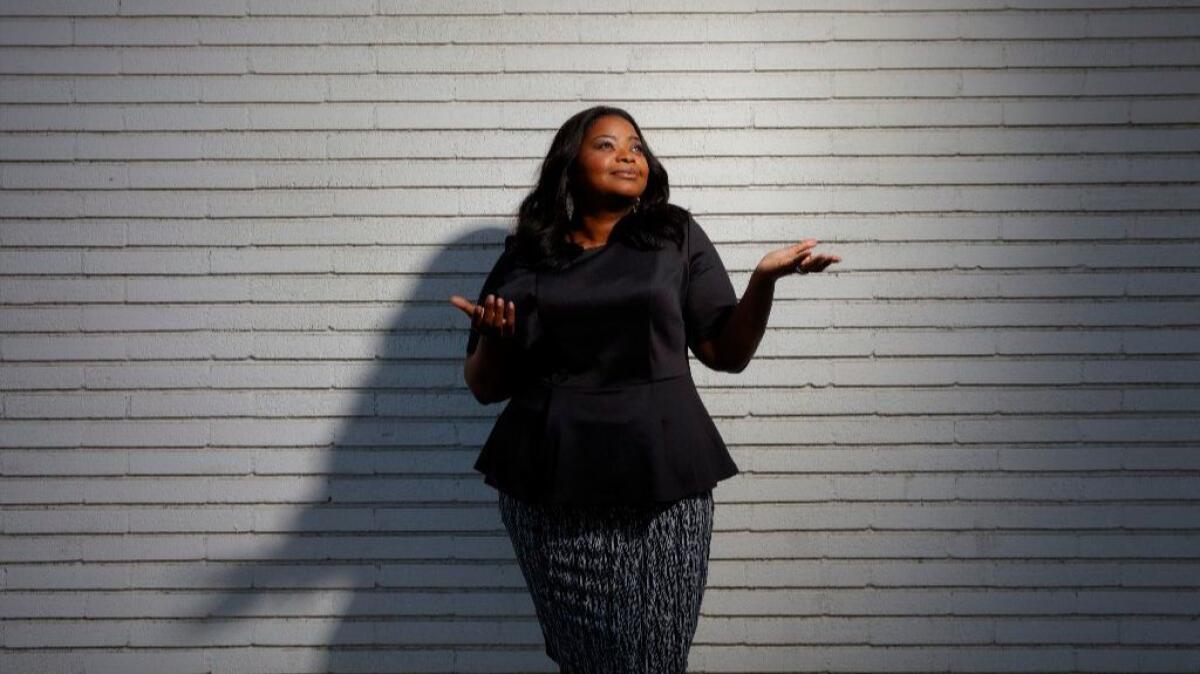For Octavia Spencer, moving past race to play a ‘regular woman’ in ‘Shape of Water’ was refreshing

Octavia Spencer has an Oscar for her performance as the spirited Minny Jackson in “The Help,” and multiple nominations across the awards spectrum for performances in “Fruitvale Station,” as a commandeering mother, and as mathematician Dorothy Vaughan in “Hidden Figures.” But though film and TV roles keep coming, not many are custom-crafted with her specifically in mind.
“I have very few roles written for me,” says Spencer, 47. She was therefore delighted when her agent informed her that she’d been the inspiration for a part in “The Shape of Water,” which filmmaker Guillermo del Toro wrote and directed. In it, Spencer is Zelda, a cleaning woman in a government facility who works the night shift alongside her mute best friend, Elisa (Sally Hawkins). “The Shape of Water” has been described as a period fairy tale and a quasi-monster movie. But in the scenes where chatty Zelda and facially expressive Elisa roam the halls, it becomes a film about how true friendship can elevate even the dreariest of landscapes.
Zelda pushes a mop at a job with dismissive male bosses then deals with an unappreciative husband at home. Did her lot in life give you pause?
There was a part of me that went, “I don’t know how I feel about this.” I’ve played maids before and she’s not a maid but she’s definitely a subordinate, definitely part of the invisible realm of people in society. But for the first time, my character was just like every other woman, complaining about her relationship and talking about the things that were bothering her. It felt as if she was the most contemporary woman I’d ever played. The fact that I got to be a regular woman? That was refreshing.
WATCH: Video Q&As from this season’s hottest contenders »
As with “The Help” and “Hidden Figures,” this film is set in the ’60s. What’s the upside of returning to this era?
There was a little less for me to do as far as my preparation. But you know what? 98% of the scripts I’m sent have everything to do with my race, not who I am as a woman. And it’s a very hard emotional place to be in, playing women with no emotional agency, who have no voice whatsoever about the outcome of their life. So I’m now to the point where if [a script] has anything to do with race and history, I’m not the person to come to.
Zelda has a lot to say. Your scene partner doesn’t. Is that challenging?
It was difficult and I was glad to have other characters that talked in scenes. I’m dyslexic, I have a different way to get everything down. And to constantly not have vocal cues to help me cement the dialogue in my mind? As people, we naturally tend to zone out when people ramble. We start thinking to ourselves, “OK, what do I need to get done today?” And as I was preparing, even I’d zone out.
Why do you think you’re often cast as part of a tight sisterhood of women?
I’m the sixth of seven kids. I know what it’s like to be part of a very insular, protective group. When you come from a big family, you know that there’s a hierarchy. There are people who are going to get more time because they’re older, and you’re at the bottom of the totem pole in terms of responsibility.
Is it true that your film debut came from asking Joel Schumacher if you could play a rabble-rouser in “A Time to Kill”?
Yes, and he said to me, “Your face is too sweet. You can be Sandy [Bullock]’s nurse,” and thus began my career as a sweet-faced nurse. I’ve played a gazillion nurses and unless it’s a nurse that’s going to do something completely different, I say no. But I never say never. How many mom roles are we all going to play? How many wife roles are we all going to play? There’s so few archetypes that we get to play that I’d be limiting myself if I said, “I’m never playing this again.”
During production, Guillermo del Toro is always assembling sequences from dailies. Would he ever show them to you?
Every day Guillermo would say, “Octavia, come here. I want to show you something.” He’s so excited about the work. And I remember the moment that Elisa starts hanging out in the lab, teaching the creature sign language. I got so choked up. It just really was boy meets girl and the getting-to-know-you phase when you first start dating someone. I didn’t realize how emotional I’d feel.
You were one of the first to go on social media and talk about Harvey Weinstein. Last year at the Oscars, you wore a feathered gown from his fashion designer wife’s line. If nominated, would you repeat that choice?
Absolutely I’d wear her again. She’s not the person who did those acts. It was her husband and I guarantee you, he wasn’t standing by the door saying, “Hey, Georgina? I’m going to go out and harass some women. How do you feel about that?” I feel for her. I reached out to her and let her know I was praying for her and for her kids. Because she’s going through it right now. I have no problems with Georgina Chapman. None.
More to Read
From the Oscars to the Emmys.
Get the Envelope newsletter for exclusive awards season coverage, behind-the-scenes stories from the Envelope podcast and columnist Glenn Whipp’s must-read analysis.
You may occasionally receive promotional content from the Los Angeles Times.







